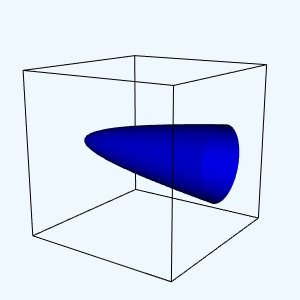DisplayQuadricSurfaces
Repository source: DisplayQuadricSurfaces
Description¶
This example demonstrates how to display several types of quadric surfaces.
Other languages
See (Python)
Question
If you have a question about this example, please use the VTK Discourse Forum
Code¶
DisplayQuadricSurfaces.cxx
#include <vtkActor.h>
#include <vtkCamera.h>
#include <vtkContourFilter.h>
#include <vtkNamedColors.h>
#include <vtkNew.h>
#include <vtkOutlineFilter.h>
#include <vtkPolyDataMapper.h>
#include <vtkProperty.h>
#include <vtkQuadric.h>
#include <vtkRenderWindow.h>
#include <vtkRenderWindowInteractor.h>
#include <vtkRenderer.h>
#include <vtkSampleFunction.h>
namespace {
void Other();
void Sphere();
void Cone();
void Ellipsoid();
void Cylinder();
void HyperboloidOneSheet();
void HyperboloidTwoSheets();
void HyperbolicParaboloid();
void EllipticParaboloid();
void PlotFunction(vtkQuadric* quadric, double value);
} // namespace
int main(int, char*[])
{
// Other();
// Sphere();
// Cone();
// Ellipsoid();
// Cylinder();
// HyperboloidOneSheet();
// HyperboloidTwoSheets();
// HyperbolicParaboloid();
EllipticParaboloid();
return EXIT_SUCCESS;
}
namespace {
void Sphere()
{
// Create the quadric function definition.
vtkNew<vtkQuadric> quadric;
quadric->SetCoefficients(1, 1, 1, 0, 0, 0, 0, 0, 0, 0);
// F(x,y,z) = a0*x^2 + a1*y^2 + a2*z^2 + a3*x*y + a4*y*z + a5*x*z + a6*x +
// a7*y + a8*z + a9 F(x,y,z) = 1*x^2 + 1*y^2 + 1*z^2
PlotFunction(quadric, 1.0);
}
void EllipticParaboloid()
{
// Create the quadric function definition.
vtkNew<vtkQuadric> quadric;
quadric->SetCoefficients(1, 1, 0, 0, 0, 0, 0, 0, -1, 0);
// F(x,y,z) = a0*x^2 + a1*y^2 + a2*z^2 + a3*x*y + a4*y*z + a5*x*z + a6*x +
// a7*y + a8*z + a9 F(x,y,z) = 1*x^2 + 1*y^2
PlotFunction(quadric, 10.0);
}
void HyperbolicParaboloid()
{
// Create the quadric function definition.
vtkNew<vtkQuadric> quadric;
quadric->SetCoefficients(1, -1, 0, 0, 0, 0, 0, 0, 0, 0);
// F(x,y,z) = a0*x^2 + a1*y^2 + a2*z^2 + a3*x*y + a4*y*z + a5*x*z + a6*x +
// a7*y + a8*z + a9 F(x,y,z) = 1*x^2 - 1*y^2
PlotFunction(quadric, 10.0);
}
void Cylinder()
{
// Create the quadric function definition.
vtkNew<vtkQuadric> quadric;
quadric->SetCoefficients(1, 1, 0, 0, 0, 0, 0, 0, 0, 0);
// F(x,y,z) = a0*x^2 + a1*y^2 + a2*z^2 + a3*x*y + a4*y*z + a5*x*z + a6*x +
// a7*y + a8*z + a9 F(x,y,z) = 1*x^2 + 1*y^2
PlotFunction(quadric, 1.0);
}
void HyperboloidOneSheet()
{
// Create the quadric function definition.
vtkNew<vtkQuadric> quadric;
quadric->SetCoefficients(1, 1, -1, 0, 0, 0, 0, 0, 0, 0);
// F(x,y,z) = a0*x^2 + a1*y^2 + a2*z^2 + a3*x*y + a4*y*z + a5*x*z + a6*x +
// a7*y + a8*z + a9 F(x,y,z) = 1*x^2 + 1*y^2
PlotFunction(quadric, 1.0);
}
void HyperboloidTwoSheets()
{
// Create the quadric function definition.
vtkNew<vtkQuadric> quadric;
quadric->SetCoefficients(1, 1, -1, 0, 0, 0, 0, 0, 0, 0);
// F(x,y,z) = a0*x^2 + a1*y^2 + a2*z^2 + a3*x*y + a4*y*z + a5*x*z + a6*x +
// a7*y + a8*z + a9 F(x,y,z) = 1*x^2 + 1*y^2
PlotFunction(quadric, -1.0);
}
void Ellipsoid()
{
// Create the quadric function definition.
vtkNew<vtkQuadric> quadric;
quadric->SetCoefficients(1, 1, 2, 0, 0, 0, 0, 0, 0, 0);
// F(x,y,z) = a0*x^2 + a1*y^2 + a2*z^2 + a3*x*y + a4*y*z + a5*x*z + a6*x +
// a7*y + a8*z + a9 F(x,y,z) = 1*x^2 + 1*y^2 + 1*z^2
PlotFunction(quadric, -1.0);
}
void Cone()
{
// Create the quadric function definition.
vtkNew<vtkQuadric> quadric;
quadric->SetCoefficients(1, 1, -1, 0, 0, 0, 0, 0, 0, 0);
// F(x,y,z) = a0*x^2 + a1*y^2 + a2*z^2 + a3*x*y + a4*y*z + a5*x*z + a6*x +
// a7*y + a8*z + a9 F(x,y,z) = 1*x^2 + 1*y^2 - 1*z^2
PlotFunction(quadric, 0.0);
}
void Other()
{
// Create the quadric function definition.
vtkNew<vtkQuadric> quadric;
quadric->SetCoefficients(.5, 1, .2, 0, .1, 0, 0, .2, 0, 0);
// F(x,y,z) = a0*x^2 + a1*y^2 + a2*z^2 + a3*x*y + a4*y*z + a5*x*z + a6*x +
// a7*y + a8*z + a9 F(x,y,z) = 0.5*x^2 + 1*y^2 + 0.2*z^2 + 0*x*y + 0.1*y*z +
// 0*x*z + 0*x + 0.2*y + 0*z + 0
PlotFunction(quadric, 1.0);
}
void PlotFunction(vtkQuadric* quadric, double value)
{
vtkNew<vtkNamedColors> colors;
// Sample the quadric function.
vtkNew<vtkSampleFunction> sample;
sample->SetSampleDimensions(50, 50, 50);
sample->SetImplicitFunction(quadric);
// double xmin = 0, xmax=1, ymin=0, ymax=1, zmin=0, zmax=1;
double bounds[6]{-10, 11, -10, 10, -10, 10};
sample->SetModelBounds(bounds);
// Create five surfaces F(x,y,z) = constant between range specified.
/*
vtkNew<vtkContourFilter> contours;
contours->SetInputConnection(sample->GetOutputPort());
contours->GenerateValues(5, 0.0, 1.2);
*/
// Create the 0 isosurface.
vtkNew<vtkContourFilter> contours;
contours->SetInputConnection(sample->GetOutputPort());
contours->GenerateValues(1, value, value);
// Map the contours to graphical primitives.
vtkNew<vtkPolyDataMapper> contourMapper;
contourMapper->SetInputConnection(contours->GetOutputPort());
contourMapper->SetScalarRange(0.0, 1.2);
// Create an actor for the contours.
vtkNew<vtkActor> contourActor;
contourActor->SetMapper(contourMapper);
// -- create a box around the function to indicate the sampling volume --
// Create outline.
vtkNew<vtkOutlineFilter> outline;
outline->SetInputConnection(sample->GetOutputPort());
// Map it to graphics primitives.
vtkNew<vtkPolyDataMapper> outlineMapper;
outlineMapper->SetInputConnection(outline->GetOutputPort());
// Create an actor for it.
vtkNew<vtkActor> outlineActor;
outlineActor->SetMapper(outlineMapper);
outlineActor->GetProperty()->SetColor(colors->GetColor3d("Black").GetData());
// Setup the window.
vtkNew<vtkRenderer> ren1;
vtkNew<vtkRenderWindow> renWin;
renWin->AddRenderer(ren1);
renWin->SetWindowName("DisplayQuadricSurfaces");
vtkNew<vtkRenderWindowInteractor> iren;
iren->SetRenderWindow(renWin);
// Add the actors to the scene.
ren1->AddActor(contourActor);
ren1->AddActor(outlineActor);
ren1->SetBackground(colors->GetColor3d("AliceBlue").GetData());
// Render and interact.
renWin->Render();
ren1->GetActiveCamera()->Azimuth(-55);
ren1->GetActiveCamera()->Elevation(15);
iren->Start();
}
} // namespace
CMakeLists.txt¶
cmake_minimum_required(VERSION 3.12 FATAL_ERROR)
project(DisplayQuadricSurfaces)
find_package(VTK COMPONENTS
CommonColor
CommonCore
CommonDataModel
FiltersCore
FiltersModeling
ImagingHybrid
InteractionStyle
RenderingContextOpenGL2
RenderingCore
RenderingFreeType
RenderingGL2PSOpenGL2
RenderingOpenGL2
)
if (NOT VTK_FOUND)
message(FATAL_ERROR "DisplayQuadricSurfaces: Unable to find the VTK build folder.")
endif()
# Prevent a "command line is too long" failure in Windows.
set(CMAKE_NINJA_FORCE_RESPONSE_FILE "ON" CACHE BOOL "Force Ninja to use response files.")
add_executable(DisplayQuadricSurfaces MACOSX_BUNDLE DisplayQuadricSurfaces.cxx )
target_link_libraries(DisplayQuadricSurfaces PRIVATE ${VTK_LIBRARIES}
)
# vtk_module_autoinit is needed
vtk_module_autoinit(
TARGETS DisplayQuadricSurfaces
MODULES ${VTK_LIBRARIES}
)
Download and Build DisplayQuadricSurfaces¶
Click here to download DisplayQuadricSurfaces and its CMakeLists.txt file. Once the tarball DisplayQuadricSurfaces.tar has been downloaded and extracted,
cd DisplayQuadricSurfaces/build
If VTK is installed:
cmake ..
If VTK is not installed but compiled on your system, you will need to specify the path to your VTK build:
cmake -DVTK_DIR:PATH=/home/me/vtk_build ..
Build the project:
make
and run it:
./DisplayQuadricSurfaces
WINDOWS USERS
Be sure to add the VTK bin directory to your path. This will resolve the VTK dll's at run time.
